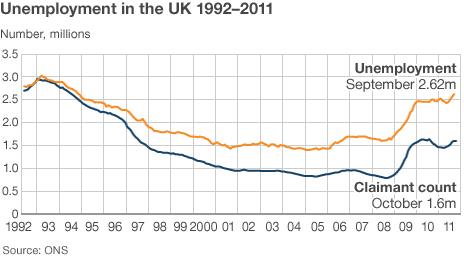UK unemployment increases to 2.62m
- Published
- comments

UK unemployment rose by 129,000 in the three months to September to 2.62 million, as youth unemployment rose above a million.
The jobless total for 16 to 24-year-olds hit a record of 1.02 million in the quarter and female unemployment was at its highest for 23 years.
The Office for National Statistics (ONS) said the jobless rate hit 8.3%.
The number of people out of work and claiming Jobseeker's Allowance rose by 5,300 to 1.6 million in October.
The news comes as the Bank of England's governor Sir Mervyn King said Britain's economy could stagnate until the middle of next year.
The Bank cut its 2011 and 2012 growth predictions to about 1%, warning the global economic outlook had "worsened".
Female unemployment
The unemployment rate of 8.3% is the highest since 1996 and the total number of unemployed people the highest since 1994.
The number of women out of work increased by 43,000 to 1.09 million, the highest level since February 1988.
The unemployment rate was highest in the North East, at 11.6% and lowest in the South East at 6.3%.
Eurozone debate
The number of people in work was also down 197,000 on the quarter.
"These figures show just how much our economy is being affected by the crisis in the eurozone," said Employment Minister Chris Grayling.
"Our European partners must take urgent action to stabilise the position," he added.
But his view did not find universal backing within the government. A senior Liberal Democrat peer, Lord Oakeshott, said Mr Grayling needed a lesson in economics if he believed the eurozone crisis was to blame for rising UK unemployment.
The opposition, for its part, blamed the government's spending cuts for the rise.
"The British economic recovery was choked off well before the instability in the last few months in the eurozone," said shadow chancellor Ed Balls.
"The government is cutting too far and too fast and it's pushing borrowing and unemployment up at the same time," he added.
The government says it has launched initiatives to help 350,000 young people into work.
The number of young people out of work during the three months to September rose by 67,000.
The total is the highest since comparable records began 19 years ago.
The figure includes 286,000 people in full time education looking for part-time work.
"Today's figures are a wake-up call for Britain. It is critical to help young people into work for the future of our economy and society," said Martina Milburn from the Prince's Trust charity, which works with young people.
Self-employed rise
The figures from the office of national statistics also showed average earnings grew by 2.3% in the year to September, down 0.4% on the previous month.
The fall will further reduce pressure on the Bank of England to increase rates to tackle inflation.
The number of employees excluding the self-employed fell by 305,000 to 24.79m, the lowest since records begun.
At the same time, the number of self-employed people reached a record high of 4.09 million.
Michael Hill says the poor transport links in his town hampers his job prospects
Economy
The high unemployment numbers will increase attention on the government's autumn statement which is expected to focus on measures to promote growth.
However, Chancellor George Osborne is unlikely to suggest any changes to plans to cut the deficit.
The Bank of England has cut its growth forecast for 2011-12 from about 1.5% to about 1%.
With unemployment rising and wages increasing by less than inflation, some economists are concerned that growth will stagnate further.
"When you have bad wage growth and rising unemployment, it doesn't bode well for consumption," said George Buckley from Deutsche Bank.




